Unit 1-2 复习课件(重点考点 练习)(共20张PPT)
文档属性
| 名称 | Unit 1-2 复习课件(重点考点 练习)(共20张PPT) | 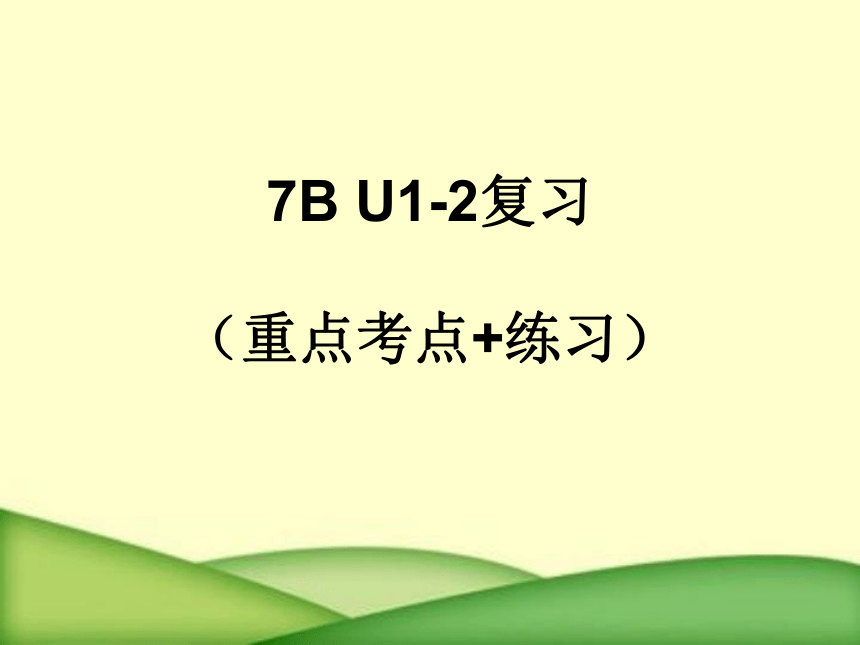 | |
| 格式 | zip | ||
| 文件大小 | 123.8KB | ||
| 资源类型 | 教案 | ||
| 版本资源 | 牛津译林版 | ||
| 科目 | 英语 | ||
| 更新时间 | 2022-05-11 20:43:08 | ||
图片预览

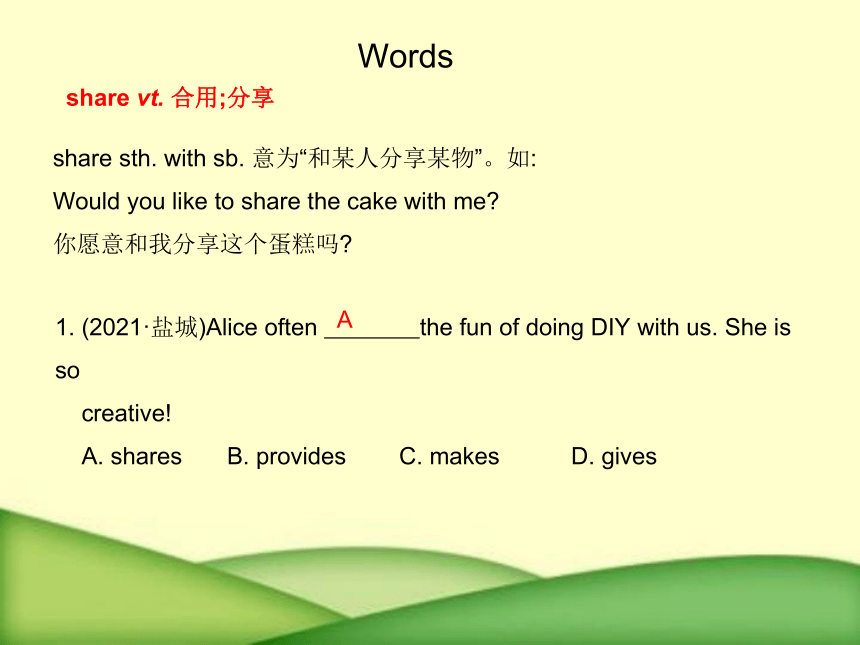
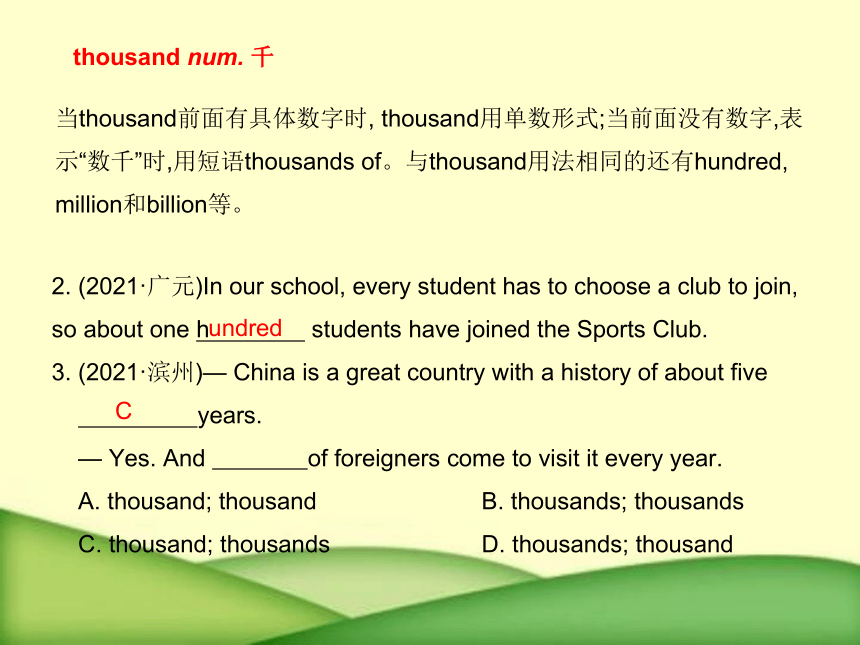
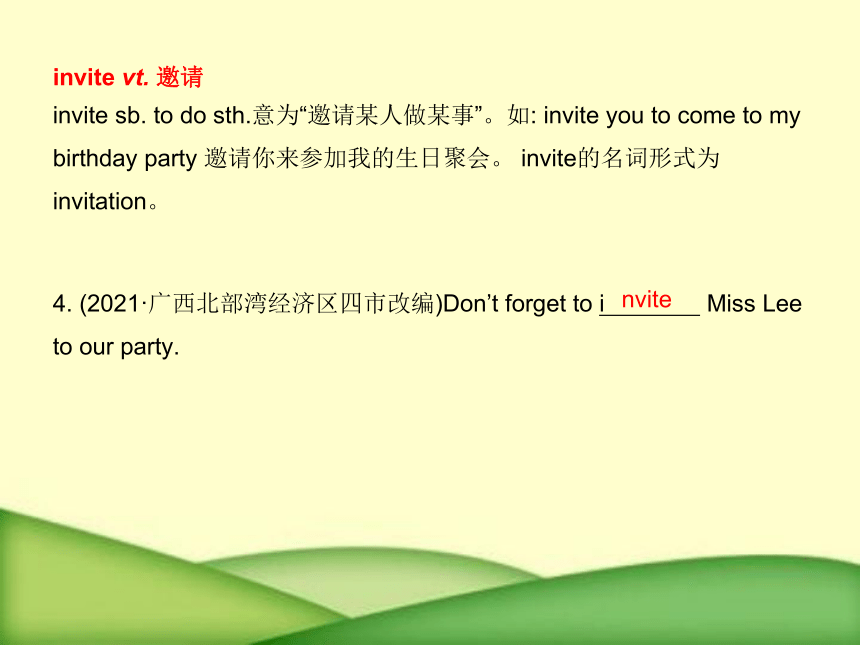
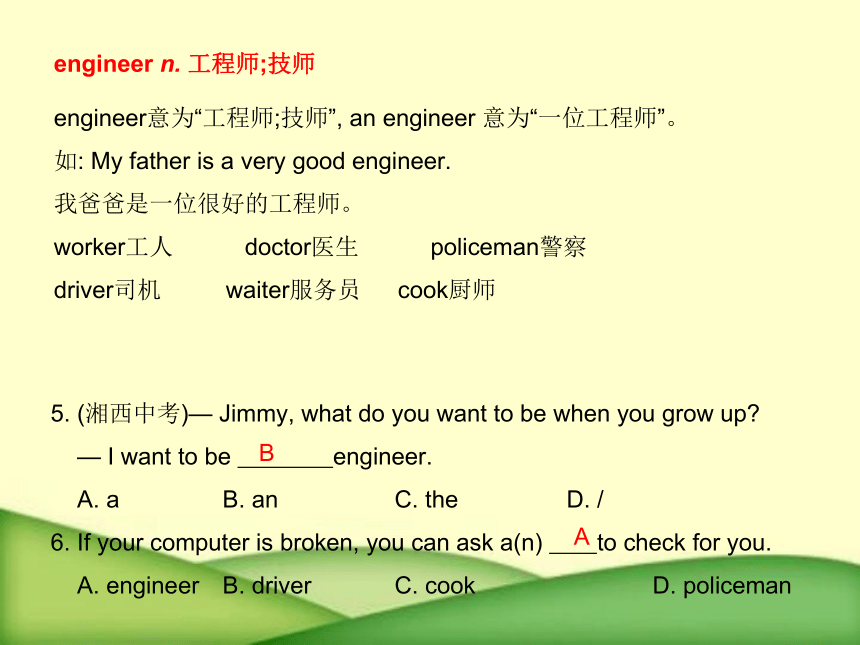
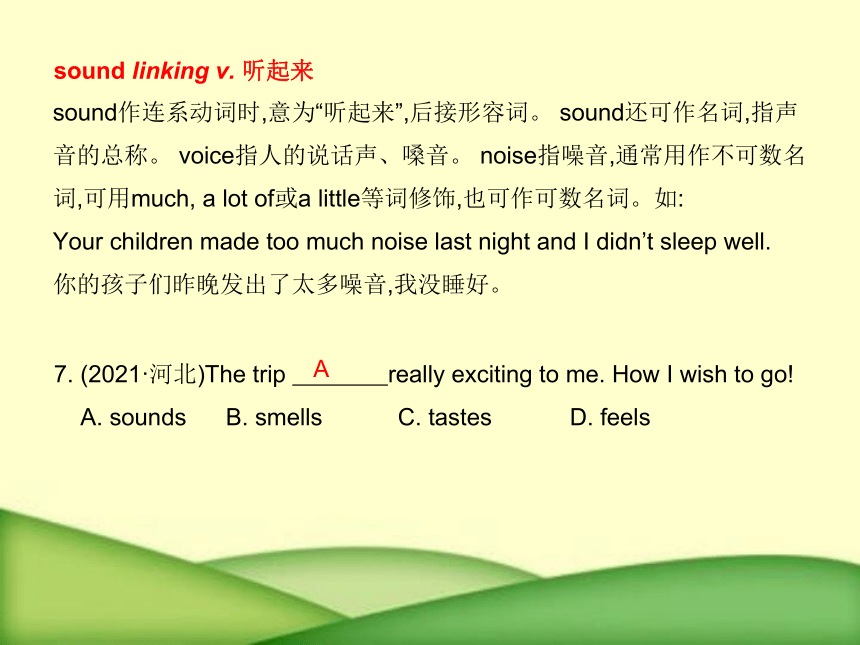
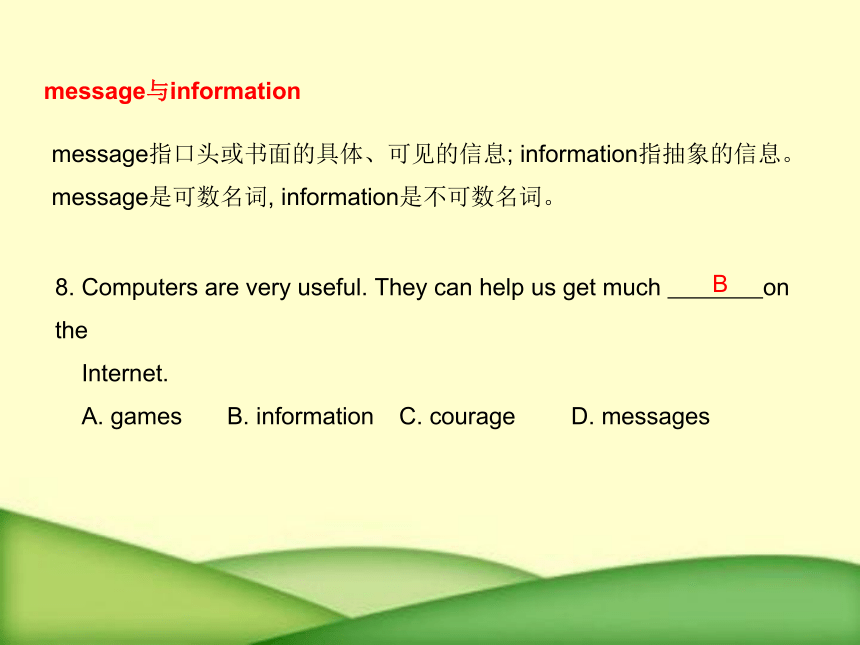
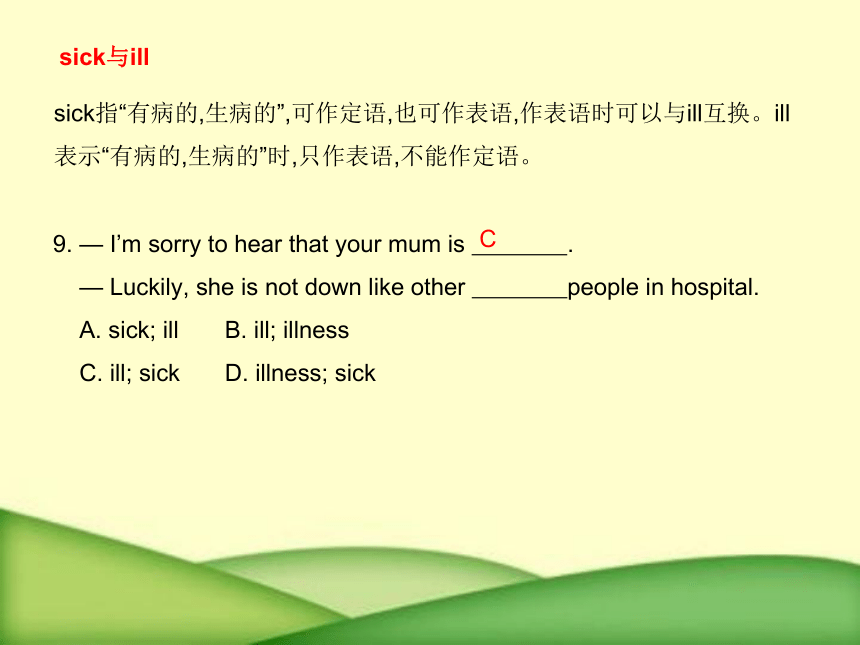
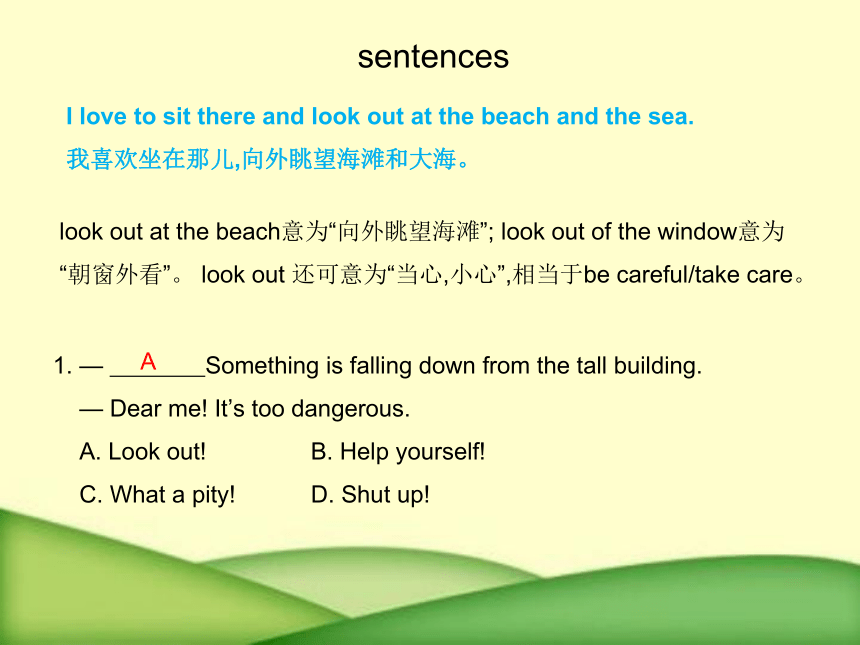
文档简介
(共20张PPT)
7B U1-2复习
(重点考点+练习)
share vt. 合用;分享
share sth. with sb. 意为“和某人分享某物”。如:
Would you like to share the cake with me
你愿意和我分享这个蛋糕吗
1. (2021·盐城)Alice often the fun of doing DIY with us. She is so
creative!
A. shares B. provides C. makes D. gives
A
Words
thousand num. 千
当thousand前面有具体数字时, thousand用单数形式;当前面没有数字,表示“数千”时,用短语thousands of。与thousand用法相同的还有hundred, million和billion等。
2. (2021·广元)In our school, every student has to choose a club to join, so about one h students have joined the Sports Club.
3. (2021·滨州)— China is a great country with a history of about five
years.
— Yes. And of foreigners come to visit it every year.
A. thousand; thousand B. thousands; thousands
C. thousand; thousands D. thousands; thousand
undred
C
invite vt. 邀请
invite sb. to do sth.意为“邀请某人做某事”。如: invite you to come to my birthday party 邀请你来参加我的生日聚会。 invite的名词形式为invitation。
4. (2021·广西北部湾经济区四市改编)Don’t forget to i Miss Lee to our party.
nvite
engineer n. 工程师;技师
engineer意为“工程师;技师”, an engineer 意为“一位工程师”。
如: My father is a very good engineer.
我爸爸是一位很好的工程师。
worker工人 doctor医生 policeman警察
driver司机 waiter服务员 cook厨师
5. (湘西中考)— Jimmy, what do you want to be when you grow up
— I want to be engineer.
A. a B. an C. the D. /
6. If your computer is broken, you can ask a(n) to check for you.
A. engineer B. driver C. cook D. policeman
B
A
sound linking v. 听起来
sound作连系动词时,意为“听起来”,后接形容词。 sound还可作名词,指声音的总称。 voice指人的说话声、嗓音。 noise指噪音,通常用作不可数名词,可用much, a lot of或a little等词修饰,也可作可数名词。如:
Your children made too much noise last night and I didn’t sleep well.
你的孩子们昨晚发出了太多噪音,我没睡好。
7. (2021·河北)The trip really exciting to me. How I wish to go!
A. sounds B. smells C. tastes D. feels
A
message与information
message指口头或书面的具体、可见的信息; information指抽象的信息。 message是可数名词, information是不可数名词。
8. Computers are very useful. They can help us get much on the
Internet.
A. games B. information C. courage D. messages
B
sick与ill
sick指“有病的,生病的”,可作定语,也可作表语,作表语时可以与ill互换。ill表示“有病的,生病的”时,只作表语,不能作定语。
9. — I’m sorry to hear that your mum is .
— Luckily, she is not down like other people in hospital.
A. sick; ill B. ill; illness
C. ill; sick D. illness; sick
C
I love to sit there and look out at the beach and the sea.
我喜欢坐在那儿,向外眺望海滩和大海。
look out at the beach意为“向外眺望海滩”; look out of the window意为“朝窗外看”。 look out 还可意为“当心,小心”,相当于be careful/take care。
1. — Something is falling down from the tall building.
— Dear me! It’s too dangerous.
A. Look out! B. Help yourself!
C. What a pity! D. Shut up!
A
sentences
I also have a bedroom of my own, but it is not big.
我也有一间属于自己的卧室,但是不大。
a bedroom of my own相当于my own bedroom。
拓展: on one’s own表示“独自”。
2. Mr Green bought a shirt . How happy he was!
A. his B. of his own
C. him D. own
B
May I speak to Daniel, please
请问我可以和丹尼尔通电话吗
电话用语归纳:
1. “May/Can/Could I speak to ..., please ”表示“请问我可以和……通电话吗 ”=“Is ...there, please ”表示“请问……在吗 ”。如: Can I speak to Helen, please = Is Helen there, please 请问我可以和海伦通电话吗 /请问海伦在吗
如果对方就是你要找的那个人,他/她通常会说“Speaking/This is ...speaking.(我就是……)”。
2. “This is ...”电话用语中不用I,而用this来表示“我”。如: This is Simon (speaking). 我是西蒙。
3. 在电话里询问对方是谁,用“Who’s that (speaking) ”。“Is that ...(speaking) ”表示“你是……吗 ”,切记不能用“Who are you ”。
3. — Hello, may I speak Mike
— This is Mike speaking.
A. at B. to C. in D. on
4. — This is Tara Patel from Kidderminster. Could I speak to Mr Smith, please
—
A. Hello. B. I’m Mr Smith. C. Who are you D. Speaking.
5. (昆明中考)— Hello, may I speak to Gina
—
A. Hi, this is Gina speaking.
B. Hi, I’m Gina.
C. May I know your address
D. May I take a message for you
B
D
A
There’s something wrong with my computer.
我的电脑出故障了。
1. “There is something wrong with ...” = “Something is wrong with ...” = “...is not working well.” = “...is broken.”表示“……坏了,出故障了”。
注意:此句型中形容词wrong修饰不定代词something。当形容词修饰不定代词,如someone, anyone时,应将形容词放在所修饰的不定代词之后。
2. “There’s nothing wrong with ...” = “Nothing is wrong with ...”意为“……没有问题”。
6. “We used to live in (break) houses, but now we’re satisfied with the flats built by the local government,” the farmer told the reporters excitedly.
7. — What’s the time My watch doesn’t .
— It’s a quarter to ten.
A. help B. step C. work D. walk
8. (武威中考) There’s wrong with the engine—it’s making strange noises.
A. nothing B. anything C. everything D. something
broken
C
D
Are you worrying about what to wear to a party or how to design your home
你在为参加聚会该穿什么或者怎样设计你的家而烦恼吗
1. “worry about ...”意为“为……而烦恼/担心”,后面接名词或动名词作宾语。如: I worry about learning English. 我为学英语而担心。
2. what to wear to a party 和 how to design your home是“疑问词+动词不定式”结构,在句中作worry about的宾语。如: Do you know what to do next 你知道接下来做什么吗
9. Don’t worry about too much homework. It’s easy.
A. have B. to have C. having D. will have
10. I don’t know at the meeting. I can do nothing to help.
A. how to say B. when to say C. what to say D. why to say
C
C
基数词和序数词的用法
基数词表数目,如one, two, three;序数词表顺序,如first, second, third。
1. 基数词的读写
(1) 读“几百几十几”时,百位与十位之间用and连接,十位与个位之间加连字符。如:403—four hundred and three。
(2) 超过百位的数时,从个位起用三位一段。从右往左分别是thousand, million, billion(十亿)。各逗号后的三位数遵循“几百几十几”的规则,如:7,321—seven thousand, three hundred and twenty-one。
2. 序数词的读写,序数词前一般加the。
(1) 基数词变序数词口诀:基变序,有规律,词尾加th, (fourth, sixth);一、二、
Grammar
三特殊例,结尾字母t, d ,d (first, second, third);八减t,九去e (eighth, ninth), f来把-ve替(fifth, twelfth); ty变-tieth,若要碰到几十几,只变个位就可以。
(2) 年、月、日表达方法:1999年10月1日—1st October, 1999/the first of October, nineteen ninety-nine。
3. 英语中“万”用thousand表示。 如: ten thousand (10,000), one hundred thousand(100,000)。hundreds of, thousands of, millions of表示“数百的”“成千上万的”和“数百万的”。
1. (2021·随州)December is the t month of a year.
2. (2021·扬州宝应一模)Look! The (four) lady from the left in the photo is my favourite teacher.
3. (2021·南京)My mum gave me this computer as my (sixteen)
birthday present.
welfth
fourth
sixteenth
4. (2021·泸州)— When was the Communist Party of China founded
— In 1921. It’s her birthday this year.
A. hundred B. hundredth C. hundreds of D. the hundredth
5. (2021·铜仁)There are floors in this building. He lives on the
floor.
A. thirty; nine B. thirtieth; nine C. thirtieth; ninth D. thirty; ninth
6. (2021·西宁)— I like Number “9” best, because I think it stands for “long-
lasting”.
— Me too. So I chose floor to live on.
A. nine B. ninth C. the ninth D. nineteen
7. (2021·丹东)As we all know, the Yellow River is longest river in China.
A. the twice B. the second C. twice D. second
B
D
C
B
一般将来时
1. shall常用于第一人称, will常用于第二、三人称。 will通常可以代替shall,除了以下情况:
(1) 在征求别人的意见时, will不能代替shall。
(2) will和shall的缩写形式相同,都是“‘ll”,其否定形式分别是won’t和shan’t。缩写用于非正式场合。
2. will与be going to
(1) will表示说话人认为、相信、希望或假定要发生的事,不含任何具体时间,可以指遥远的将来;而be going to指有迹象表明某事即将发生或肯定会发生,通常表示很快就要发生的事情。
(2) will 和be going to均可表示“意图”,但事先考虑过的意图用be going to,非事先考虑的意图用will。
8. (2021·常德)— The Dragon Boat Festival is coming. What are you going to do
— I (visit) my grandparents in my hometown.
9. My sister is coming to my home today. She with me for a week.
A. stays B. stayed
C. has stayed D. will stay
am going to visit
D
7B U1-2复习
(重点考点+练习)
share vt. 合用;分享
share sth. with sb. 意为“和某人分享某物”。如:
Would you like to share the cake with me
你愿意和我分享这个蛋糕吗
1. (2021·盐城)Alice often the fun of doing DIY with us. She is so
creative!
A. shares B. provides C. makes D. gives
A
Words
thousand num. 千
当thousand前面有具体数字时, thousand用单数形式;当前面没有数字,表示“数千”时,用短语thousands of。与thousand用法相同的还有hundred, million和billion等。
2. (2021·广元)In our school, every student has to choose a club to join, so about one h students have joined the Sports Club.
3. (2021·滨州)— China is a great country with a history of about five
years.
— Yes. And of foreigners come to visit it every year.
A. thousand; thousand B. thousands; thousands
C. thousand; thousands D. thousands; thousand
undred
C
invite vt. 邀请
invite sb. to do sth.意为“邀请某人做某事”。如: invite you to come to my birthday party 邀请你来参加我的生日聚会。 invite的名词形式为invitation。
4. (2021·广西北部湾经济区四市改编)Don’t forget to i Miss Lee to our party.
nvite
engineer n. 工程师;技师
engineer意为“工程师;技师”, an engineer 意为“一位工程师”。
如: My father is a very good engineer.
我爸爸是一位很好的工程师。
worker工人 doctor医生 policeman警察
driver司机 waiter服务员 cook厨师
5. (湘西中考)— Jimmy, what do you want to be when you grow up
— I want to be engineer.
A. a B. an C. the D. /
6. If your computer is broken, you can ask a(n) to check for you.
A. engineer B. driver C. cook D. policeman
B
A
sound linking v. 听起来
sound作连系动词时,意为“听起来”,后接形容词。 sound还可作名词,指声音的总称。 voice指人的说话声、嗓音。 noise指噪音,通常用作不可数名词,可用much, a lot of或a little等词修饰,也可作可数名词。如:
Your children made too much noise last night and I didn’t sleep well.
你的孩子们昨晚发出了太多噪音,我没睡好。
7. (2021·河北)The trip really exciting to me. How I wish to go!
A. sounds B. smells C. tastes D. feels
A
message与information
message指口头或书面的具体、可见的信息; information指抽象的信息。 message是可数名词, information是不可数名词。
8. Computers are very useful. They can help us get much on the
Internet.
A. games B. information C. courage D. messages
B
sick与ill
sick指“有病的,生病的”,可作定语,也可作表语,作表语时可以与ill互换。ill表示“有病的,生病的”时,只作表语,不能作定语。
9. — I’m sorry to hear that your mum is .
— Luckily, she is not down like other people in hospital.
A. sick; ill B. ill; illness
C. ill; sick D. illness; sick
C
I love to sit there and look out at the beach and the sea.
我喜欢坐在那儿,向外眺望海滩和大海。
look out at the beach意为“向外眺望海滩”; look out of the window意为“朝窗外看”。 look out 还可意为“当心,小心”,相当于be careful/take care。
1. — Something is falling down from the tall building.
— Dear me! It’s too dangerous.
A. Look out! B. Help yourself!
C. What a pity! D. Shut up!
A
sentences
I also have a bedroom of my own, but it is not big.
我也有一间属于自己的卧室,但是不大。
a bedroom of my own相当于my own bedroom。
拓展: on one’s own表示“独自”。
2. Mr Green bought a shirt . How happy he was!
A. his B. of his own
C. him D. own
B
May I speak to Daniel, please
请问我可以和丹尼尔通电话吗
电话用语归纳:
1. “May/Can/Could I speak to ..., please ”表示“请问我可以和……通电话吗 ”=“Is ...there, please ”表示“请问……在吗 ”。如: Can I speak to Helen, please = Is Helen there, please 请问我可以和海伦通电话吗 /请问海伦在吗
如果对方就是你要找的那个人,他/她通常会说“Speaking/This is ...speaking.(我就是……)”。
2. “This is ...”电话用语中不用I,而用this来表示“我”。如: This is Simon (speaking). 我是西蒙。
3. 在电话里询问对方是谁,用“Who’s that (speaking) ”。“Is that ...(speaking) ”表示“你是……吗 ”,切记不能用“Who are you ”。
3. — Hello, may I speak Mike
— This is Mike speaking.
A. at B. to C. in D. on
4. — This is Tara Patel from Kidderminster. Could I speak to Mr Smith, please
—
A. Hello. B. I’m Mr Smith. C. Who are you D. Speaking.
5. (昆明中考)— Hello, may I speak to Gina
—
A. Hi, this is Gina speaking.
B. Hi, I’m Gina.
C. May I know your address
D. May I take a message for you
B
D
A
There’s something wrong with my computer.
我的电脑出故障了。
1. “There is something wrong with ...” = “Something is wrong with ...” = “...is not working well.” = “...is broken.”表示“……坏了,出故障了”。
注意:此句型中形容词wrong修饰不定代词something。当形容词修饰不定代词,如someone, anyone时,应将形容词放在所修饰的不定代词之后。
2. “There’s nothing wrong with ...” = “Nothing is wrong with ...”意为“……没有问题”。
6. “We used to live in (break) houses, but now we’re satisfied with the flats built by the local government,” the farmer told the reporters excitedly.
7. — What’s the time My watch doesn’t .
— It’s a quarter to ten.
A. help B. step C. work D. walk
8. (武威中考) There’s wrong with the engine—it’s making strange noises.
A. nothing B. anything C. everything D. something
broken
C
D
Are you worrying about what to wear to a party or how to design your home
你在为参加聚会该穿什么或者怎样设计你的家而烦恼吗
1. “worry about ...”意为“为……而烦恼/担心”,后面接名词或动名词作宾语。如: I worry about learning English. 我为学英语而担心。
2. what to wear to a party 和 how to design your home是“疑问词+动词不定式”结构,在句中作worry about的宾语。如: Do you know what to do next 你知道接下来做什么吗
9. Don’t worry about too much homework. It’s easy.
A. have B. to have C. having D. will have
10. I don’t know at the meeting. I can do nothing to help.
A. how to say B. when to say C. what to say D. why to say
C
C
基数词和序数词的用法
基数词表数目,如one, two, three;序数词表顺序,如first, second, third。
1. 基数词的读写
(1) 读“几百几十几”时,百位与十位之间用and连接,十位与个位之间加连字符。如:403—four hundred and three。
(2) 超过百位的数时,从个位起用三位一段。从右往左分别是thousand, million, billion(十亿)。各逗号后的三位数遵循“几百几十几”的规则,如:7,321—seven thousand, three hundred and twenty-one。
2. 序数词的读写,序数词前一般加the。
(1) 基数词变序数词口诀:基变序,有规律,词尾加th, (fourth, sixth);一、二、
Grammar
三特殊例,结尾字母t, d ,d (first, second, third);八减t,九去e (eighth, ninth), f来把-ve替(fifth, twelfth); ty变-tieth,若要碰到几十几,只变个位就可以。
(2) 年、月、日表达方法:1999年10月1日—1st October, 1999/the first of October, nineteen ninety-nine。
3. 英语中“万”用thousand表示。 如: ten thousand (10,000), one hundred thousand(100,000)。hundreds of, thousands of, millions of表示“数百的”“成千上万的”和“数百万的”。
1. (2021·随州)December is the t month of a year.
2. (2021·扬州宝应一模)Look! The (four) lady from the left in the photo is my favourite teacher.
3. (2021·南京)My mum gave me this computer as my (sixteen)
birthday present.
welfth
fourth
sixteenth
4. (2021·泸州)— When was the Communist Party of China founded
— In 1921. It’s her birthday this year.
A. hundred B. hundredth C. hundreds of D. the hundredth
5. (2021·铜仁)There are floors in this building. He lives on the
floor.
A. thirty; nine B. thirtieth; nine C. thirtieth; ninth D. thirty; ninth
6. (2021·西宁)— I like Number “9” best, because I think it stands for “long-
lasting”.
— Me too. So I chose floor to live on.
A. nine B. ninth C. the ninth D. nineteen
7. (2021·丹东)As we all know, the Yellow River is longest river in China.
A. the twice B. the second C. twice D. second
B
D
C
B
一般将来时
1. shall常用于第一人称, will常用于第二、三人称。 will通常可以代替shall,除了以下情况:
(1) 在征求别人的意见时, will不能代替shall。
(2) will和shall的缩写形式相同,都是“‘ll”,其否定形式分别是won’t和shan’t。缩写用于非正式场合。
2. will与be going to
(1) will表示说话人认为、相信、希望或假定要发生的事,不含任何具体时间,可以指遥远的将来;而be going to指有迹象表明某事即将发生或肯定会发生,通常表示很快就要发生的事情。
(2) will 和be going to均可表示“意图”,但事先考虑过的意图用be going to,非事先考虑的意图用will。
8. (2021·常德)— The Dragon Boat Festival is coming. What are you going to do
— I (visit) my grandparents in my hometown.
9. My sister is coming to my home today. She with me for a week.
A. stays B. stayed
C. has stayed D. will stay
am going to visit
D
同课章节目录
